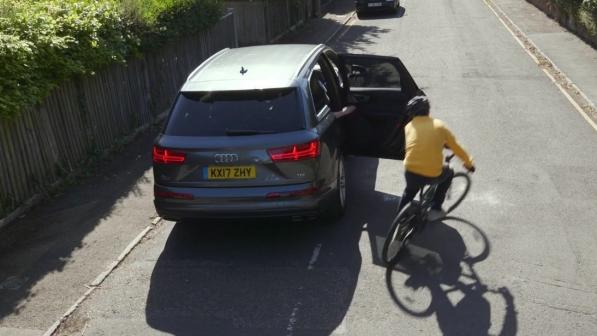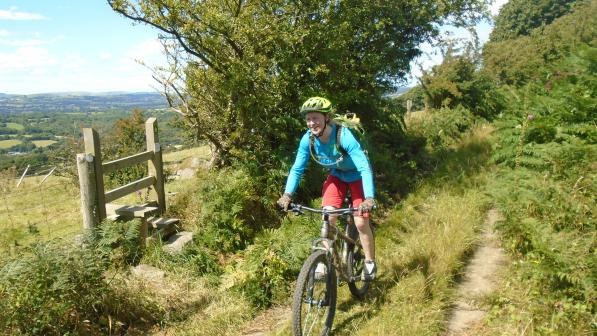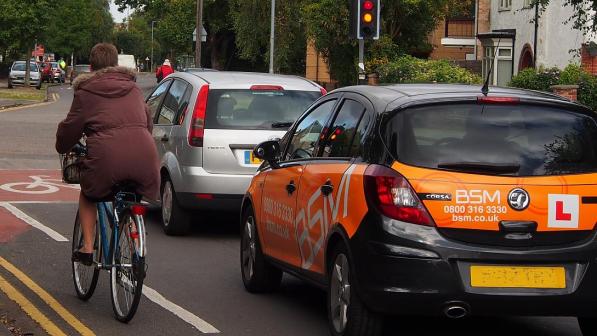What did Cycling UK's campaigns achieve in 2019?

Pushing the boundaries of education
We kicked off the year by looking to push our educational Too Close For Comfort film to new audiences by taking the headsets down to Cardiff and teaching 6th form children, who were learning to drive or would be doing so soon, how to safely overtake cyclists.
The response was fantastic, and throughout the year we carried this on, showing the films everywhere from driving instructors conferences, to clear air days, car free days and even at the British Grand Prix, ensuring a growing and diverse awareness of the issue of close passing, and the best way to overtake a cyclist.
The film and campaign were recognised at the Young Driver Road Safety Awards in March, and, as access to VR technology grows, especially as an educational tool, we’re perfectly positioned to grow the audience even further into 2020.
Do it the Dutch way

Building on the success of Too Close For Comfort, this year also saw Cycling UK partner with Uber to develop another educational film boosting awareness of the risks of car-dooring and promoting use of the Dutch Reach.
As all cyclists know, car-dooring can be a real problem, and yet many don’t realise quite how serious an issue it is. That’s why we wanted to develop a hard-hitting, snappy film, which sent a clear message: car-dooring is dangerous, but it’s easy to avoid – just do the Dutch Reach.
Campaigns officer Keir Gallagher says: “We were delighted with the result, and the response was fantastic, with the video going viral and reaching hundreds of thousands of people through our own channels and the press”.
Building on this engagement, we’ve also looked to get the technique adopted as part of driving instructors lessons, and we’ve had very positive feedback after attending two driving instructors shows, while the technique has been promoted separately in a number of driving instructor magazines and blogs. Elsewhere, we’ve seen great uptake of the technique, with everyone from taxi firms to local authorities teaching the change of habit to their staff.
With a Highway Code review coming next year, we’re hopeful this will help set the stage for its inclusion in the next version of the guide.
Watch out for those potholes

During 2019, more than 9,200 potholes and road defects were reported via our app and website, Fill That Hole. We weren’t just helping cyclists report potholes though, but also launched Pothole Watch during March which sought to highlight the real cost of potholes, not just for cyclists but all road users.
Cycling UK’s work to highlight the risk and what needs to be done about it came when we presented evidence to the Transport Committee’s inquiry “Local roads funding and maintenance: filling the gap” to which the Government responded in October.
We’re still a far cry from the funding needed to fill the UK’s pothole problem, but there was at least acknowledgement that in the future spending review mending our local roads would be included.
Cycle lane law change parked for now

Campaigning for cycling in Scotland had a boost this year with the recruitment of a new Campaigns and Policy Manager based in Scotland. Jim Densham joined us in June and was straight into campaigning for 20mph zones through a Bill in the Scottish Parliament brought by Mark Ruskell MSP. That new legislation didn’t get sufficient votes to pass but it’s a cycling safety solution we continue to support and call for.
After that disappointment there was a good result in the Transport Bill at Holyrood. It passed its third stage, and a fiery debate in Parliament, with progressive measures such as a ban on pavement parking, Low Emission Zones and Workplace Parking Levy all getting through and now being in law. During the Bill we worked with Colin Smyth MSP on his amendment to fix the law on parking in a cycle lane. Despite more than 6000 emails being sent to MSPs they voted along party lines and the amendment did not pass. Next year we will continue to push to make it easier for Local Authorities to keep cycle lanes free of parked cars.
Scottish National Transport Strategy shows promise

2019 was a big year for the future of transport in Scotland. Transport Scotland consulted the public on a new national strategy which had a great vision and decent priorities but was not so good on clear policies. We ran a campaign to help members and supporters have their say on what is needed for cycling in Scotland – with all the 600+ responses counting towards the consultation. We expect to see how Transport Scotland incorporates our ideas in the new year.
Hot on the heels of the strategy, Transport Scotland is now asking organisations like ours and the public how it should spend the billions of pounds it will spend on major transport projects over the next 20 years. There’s still time for you to have your say before the January 10th deadline but have a read of our handy guide first.
Hundreds Cycle on the Senedd for more cycling funding

Cycling UK joined local campaigners in Wales for Cycle on the Senedd, an annual rally in Cardiff which has the simple message for the Welsh Government of increasing funding for cycling and walking to at least £20 per head, to make active travel a normal everyday activity.
A new beginning for Newport

An important wildlife habitat was saved from destruction this summer when plans for a new motorway ploughing through it were scrapped.
The £1.4bn plan involved re-routing the M4 motorway for 15 miles to avoid two-lane bottleneck at the Brynglas tunnels at Newport. It would have destroyed the Gwent Levels, a hugely important wildlife habitat bounded by the Severn and Usk estuaries, and a popular area for recreational cycling.
Cycling UK’s policy director Roger Geffen and local volunteer campaigner Hugh Mackay gave evidence at a public inquiry in 2017, arguing that the Welsh Government had failed to make the case for spending over £1.4bn on a new motorway when they hadn’t considered or modelled any sustainable transport alternatives which would serve to alleviate congestion and pollution.
When Mark Drakeford AM was elected as First Minister he was convinced by the case to save the Gwent Levels, and scrapped the M4 scheme.
Thousands more trails to explore in Wales

In April the Welsh Government announced proposals for a landmark reform of access laws which will create many more opportunities for exploring the outdoors by opening up many (not all) footpaths for cycling and horse riding.
It follows four years of campaigning by Cycling UK and OpenMTB, joined by other outdoor organisations. Our supporters sent more than 12,000 emails to the Welsh Government calling for increased access to the countryside, proving the demand for more multi-use trails.
Moving forward, Cycling UK will be joining other organisations on working groups to determine the details of how the proposals will be put into practice in a way that will benefit everyone.
The Great North Trail
We also celebrated off-road riding in England and Scotland by launching the Great North Trail, an 800-mile adventure route from the Peak District to Cape Wrath or John o’ Groats on the north coast of Scotland.
The route uses some established trails such as the Pennine Bridleway and Cross Borders Drove Road, with extensive research by Cycling UK to identify the best routes to link them together.
It answers the demand for more long-distance rideable trails, to enable people to explore the most spectacular parts of the country by bike, and will continue to evolve as we campaign for increased off-road access for cycling.
The enthusiastic response from the off-road community has been fantastic, and we were thrilled to be named as Sports Staycation of the Year at the i newspaper Staycation Awards.
Watch this space for another long-distance off-road trail launching in summer 2020…
Show us the money

Over the past year we’ve been pressing the Government in Westminster for more funding for cycling and walking in England, in order to meet the targets set out in the Cycling and Walking Investment Strategy.
11,500 people supported our Funding for Cycling and Walking campaign, writing to council leaders, MPs, and Ministers. Over 200 MPs wrote to the Government, with former Transport Minister Jesse Norman MP accepting there needed to be: “Potentially double or more” the level of investment in cycling and walking” to reach the Government’s own targets to double cycle use by 2025.
On 4 September, the Chancellor of the Exchequer announced the spending commitments for next year. We and other active travel campaigners were left incredibly frustrated and disappointed that there was no mention of funding for cycling and walking.
As campaigns officer Caroline Grogan said: “Much like the climate emergency, we know we need to invest in cycling and walking now in order to address some of the most pressing problems of our time. If the Government gave firm commitments with timescales for when we could expect to see increased funding for cycling and walking, we could help to address complex problems such as air quality, obesity and the decline of the high street”.
However, it wasn’t long before we had another chance to make the case for investing in cycling and walking, as the snap general election was announced for December.
All I want for Christmas is safe cycling and walking routes

In the run up to the general election, we jumped into action and galvanised 3,500 of our supporters to write to their parliamentary candidates asking them to stand up for cycling and walking. Almost 15,000 emails were sent to candidates, and 664 signed Cycling UK’s pledge to increase spending on cycling and walking to at least 5% of total transport spend, rising to at least 10% within five years. Of those who pledged, 43 were elected as MPs.
Unfortunately, the Conservative manifesto does not live up to Boris Johnson’s promise to make the country “the cleanest, greenest on earth”. Current plans would slash the amount of funding for cycling and walking to a quarter of the current level.
Cycling UK Chief Executive, Paul Tuohy, said: “This would open up a chasm between what has been promised and what is actually needed.
“The Conservative manifesto commitment would see the current £7 per head current being spent on walking and cycling in England, outside of London drop to just £1.55 per head.”
A look ahead
With the climate crisis having moved rapidly up the agenda, constant discussions about pressures on the NHS, and a growing body of evidence about the effects of inactivity and poor air quality on our health, the need to get more people cycling has never been more pressing.
As head of advocacy and campaigns Duncan Dollimore says: “Cycling is the solution to so many problems that society faces today. More people cycling and walking would make the places we live and work safer, healthier and happier, but we need to work to build the political will to make sure this happens.”
In the new year we’ll be looking to hold both individual MPs and their parties to account for their pledges, indications of support, manifesto commitments, their targets to increase cycling levels, and their assurance that they’re serious about tackling climate, air pollution and other crises. We’ll keep you updated on our next steps and what you can do to help.
More people cycling and walking would make the places we live and work safer, healthier and happier, but we need to work to build the political will to make sure this happens.
Duncan Dollimore, Cycling UK's head of campaigns


